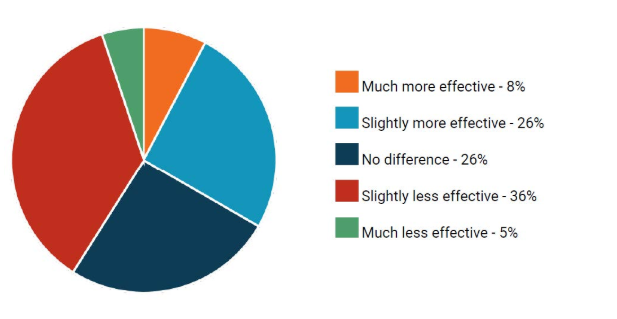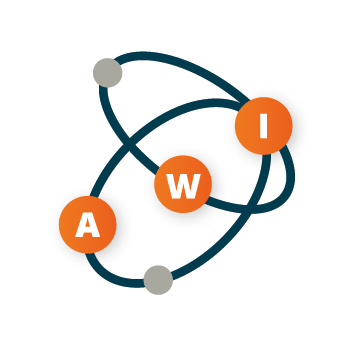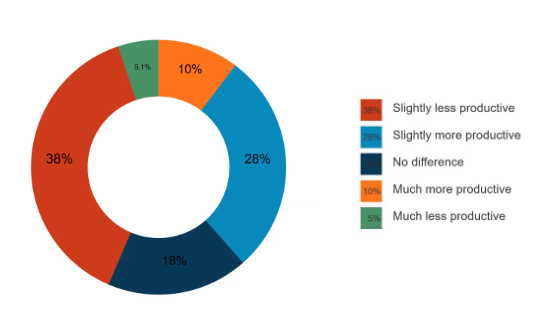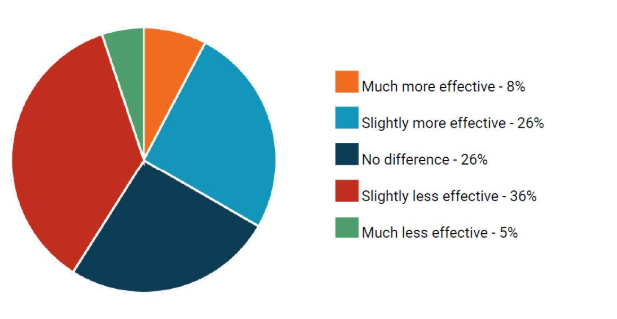
by Eileen McMorrow
The Advanced Workplace Institute’s Working AWAy series was a four-session workshop outlining the processes and tools required for managing home working teams. AWAy, as an acronym, includes the research that the Advanced Workplace Associates (AWA), brings to the workshops. The McMorrow Reports invited our readers to participate as part of our partnership with the Advanced Workplace Institute.

Making the Shift to Home-Working Effectively was the first in the series. Its key findings include understanding the difference in working experience ‘when in the office’ vs. ‘when away from the office, aimed at acknowledging and thinking about where the differences lie. Workshop participants identified the very obvious differences of Collaboration, Interaction, Community and Relationships being prominent in offices versus Focus, Quiet, Concentration, Flexibility and Productivity being the key aspects of working away. Research between the AWI and the Center for Evidence-Based Management (CEBMa) lead to this list of Ten Things to Do Differently when Working Away.
Ten Things to Do Differently when Working Away
- Spend time socializing with colleagues when you’re apart; stay in touch with what’s going on in their lives to build cohesion and closeness.
- Make your activities visible to colleagues. They can’t see you physically, so make sure they know what you’re doing and if you need support.
- Jointly agree on how to run virtual meetings and use video to see how people are and how they react. We need more feedback when we are apart.
- Take responsibility for maintaining relationships. Find out what colleagues need and share what you need. Don’t leave it to chance.
- Overtly demonstrate you can be trusted by delivering on your promises. Trustworthiness is more difficult to judge when you’re apart.
- Go out of your way to make information available to people. It’s harder to track information down when you’re working apart.
- Critically review your own communication style – without visual cues and careful listening, we overlook what helps or hinders others in being their best.
- Make sure people know about your expertise. Virtual teams have fewer opportunities to demonstrate/learn about each other’s knowledge and skills.
- Understand each other’s personalities and preferences; work on accommodating differences and not letting distance divide you.
- Make sure you see enough of your colleagues face-to-face. Plan for it and make it happen so you don’t drift apart.
Download the takeaways from Making the Shift to Home-Working Effectively, Workshop 1.
Managing the Home-Based Community was the focus of Workshop 2. AWA has been involved in research around managing agile/virtual teams carried out in collaboration with the CEBMa who searched for the best available evidence relating to strategies for managing the agile/remote workforce. The research findings identified Communication Richness, Leadership + Workership, Task Coordination, Relationships and Personality and Trust as key concepts o pay attention to when working apart from colleagues.
Download the takeaways from Managing the Home-Based Community Workshop 2.
Working at Home, Workshop 3, provided tools and tips on how to stay focused, happy and productive. Many people are comfortable working from home for a day or two a week – or for a short period to work on a specific piece of work. In the AWA client experience, the majority of people like to be in the office with their colleagues for the majority of the time.
Working from home since the Coronavirus shelter-in-place orders has been different for everyone – for many, it isn’t the same as under ‘normal’ circumstances. People must balance work and personal commitments, homeschooling, sharing their “office” with others and worrying about loved ones – all of which will affect their performance. Participants were asked how much their ‘productivity’ had changed since before the lockdown, and what factors were most impacting their performance. The chart below shows that over half of attendees either felt more productive (38%) or had not experienced a change (18%); the remainder (44%) felt less productive. When asked about the influences, work/life balance was slightly better than before and access to colleagues was slightly worse – but naturally, these results are the average across respondents and hide variations.

Download the takeaways from Working at Home, Workshop 3.
Working Online, Workshop 4, set out to help participants think about the interactions they are having with their colleagues, how these are planned and how the appropriate media are chosen for these interactions. Participants were initially asked about the effectiveness of their current team collaborations, as compared to before the Covid-19 lockdown. The pie chart shows that 41% of the audience felt less effective while perhaps a surprising 34% felt more effective. It was also interesting to see that despite being apart, 26% hadn’t experienced any change. This could be because they were already working apart from colleagues regularly or perhaps because they work in a more solitary way.

Teams are finding different ways to communicate and stay connected during the lockdown and now is the time to develop new habits that make things easier for everyone. It is quite different from being together in the office so why not think about the purpose of each interaction and plan for the intended outcomes? This inevitably takes more time and energy initially — until new habits are formed – but as communication is vital, that investment will pay off – with richer, more cohesive interactions.
Download the takeaways from Working Online, Workshop 4.
Managers interested in further engagement and assistance with Working from Home workplace change mandates and challenges can email Eileen McMorrow.
